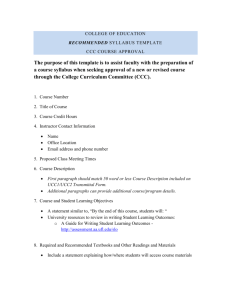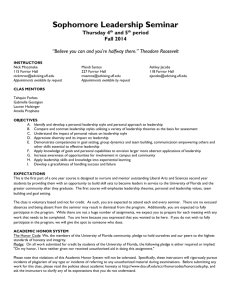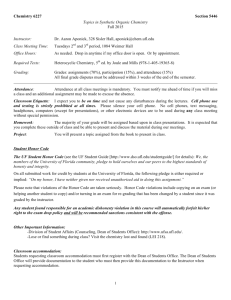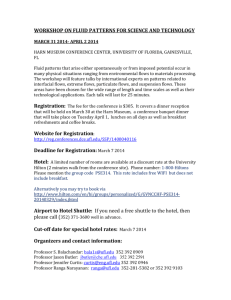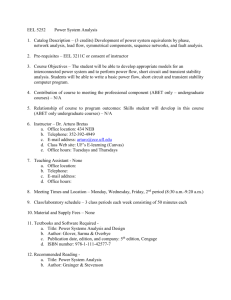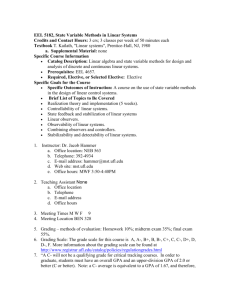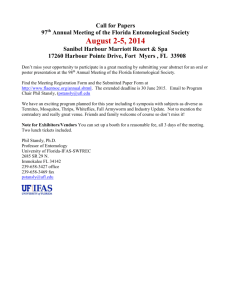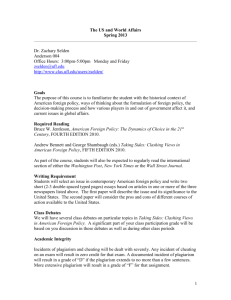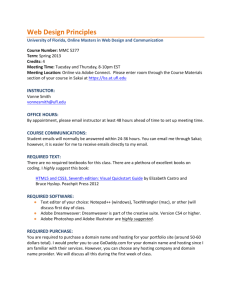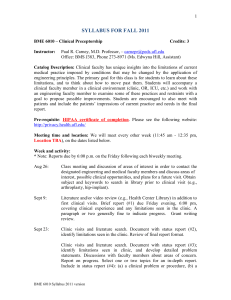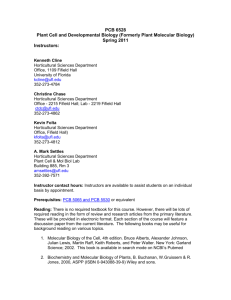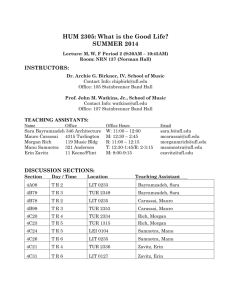MMC 6939: Innovation and Entrepreneurship in Mass Communication
advertisement
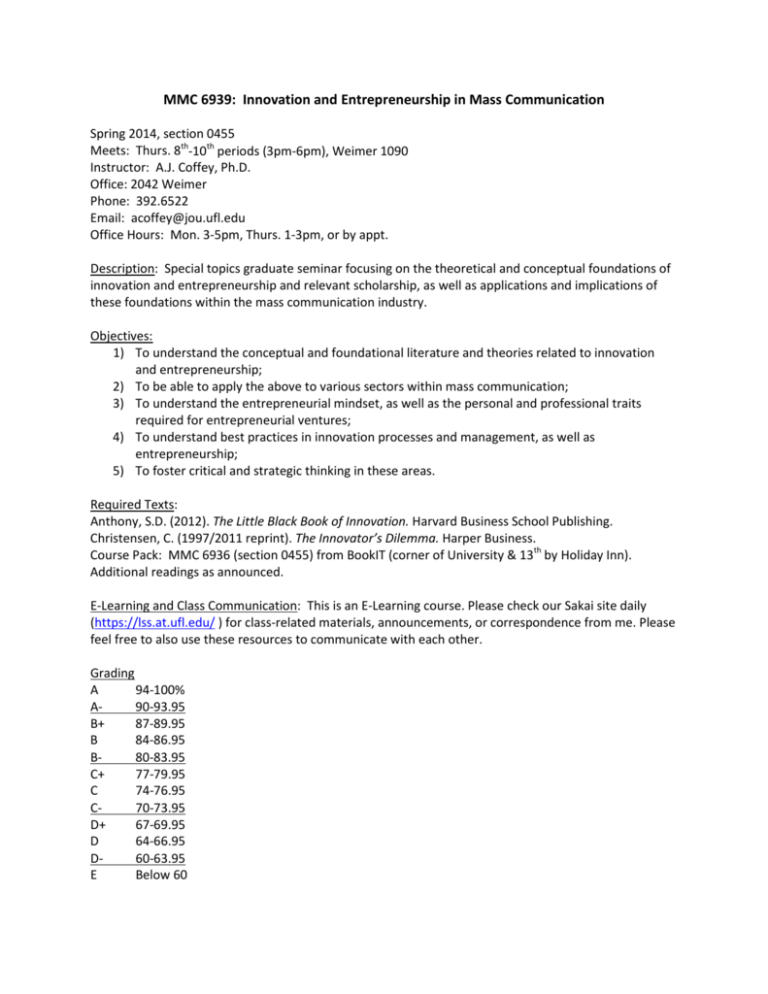
MMC 6939: Innovation and Entrepreneurship in Mass Communication Spring 2014, section 0455 Meets: Thurs. 8th-10th periods (3pm-6pm), Weimer 1090 Instructor: A.J. Coffey, Ph.D. Office: 2042 Weimer Phone: 392.6522 Email: acoffey@jou.ufl.edu Office Hours: Mon. 3-5pm, Thurs. 1-3pm, or by appt. Description: Special topics graduate seminar focusing on the theoretical and conceptual foundations of innovation and entrepreneurship and relevant scholarship, as well as applications and implications of these foundations within the mass communication industry. Objectives: 1) To understand the conceptual and foundational literature and theories related to innovation and entrepreneurship; 2) To be able to apply the above to various sectors within mass communication; 3) To understand the entrepreneurial mindset, as well as the personal and professional traits required for entrepreneurial ventures; 4) To understand best practices in innovation processes and management, as well as entrepreneurship; 5) To foster critical and strategic thinking in these areas. Required Texts: Anthony, S.D. (2012). The Little Black Book of Innovation. Harvard Business School Publishing. Christensen, C. (1997/2011 reprint). The Innovator’s Dilemma. Harper Business. Course Pack: MMC 6936 (section 0455) from BookIT (corner of University & 13th by Holiday Inn). Additional readings as announced. E-Learning and Class Communication: This is an E-Learning course. Please check our Sakai site daily (https://lss.at.ufl.edu/ ) for class-related materials, announcements, or correspondence from me. Please feel free to also use these resources to communicate with each other. Grading A 94-100% A90-93.95 B+ 87-89.95 B 84-86.95 B80-83.95 C+ 77-79.95 C 74-76.95 C70-73.95 D+ 67-69.95 D 64-66.95 D60-63.95 E Below 60 2 See https://catalog.ufl.edu/ugrad/current/regulations/info/grades.aspx for further info on university grading policies. Assignments and Evaluation Assignments* Comment Sheets Final Project** Final Presentation Participation 30% 20% 40% 5% 5% *Assignment Breakdown: -Creative destruction/Disruptive innovation analysis: 40% -Entrepreneur interview and write-up: 60% **Differs for doctoral and masters’ students. Assignments will be distributed at least one week in advance of their announced due date (syllabus dates are subject to change). The participation grade includes discussion and other informed contributions to classroom learning that are indicative of class preparation. This includes your submitted comment sheets to your peers on the assigned readings. Assignments are due on the date stated on the syllabus. Late assignments may be accepted within 24 hours (of the class period time), with a 10% penalty. Assignments turned in after this 24-hour period will not be accepted. We will also be using TurnItIn for most assignment submissions (through our Sakai site), and will discuss how to do so in class. The same deadline above also applies to the TurnItIn submission. In addition to uploading your assignment, however, please also turn in the hard copy in class for grading purposes. Comment Sheets: Each of you will be responsible for two weeks’ worth of comments to be submitted to class peers via email by Wednesday at 7:00pm. For your assigned date, please type your insights, thoughts, questions, arguments, and/or comments on the assigned readings for the next day (3-page minimum, double-spaced). Email it to each of us (in Sakai) so that we can read it in preparation for class discussion the next day. A sign-up sheet will be circulated for these dates. For those two weeks, you will also be a class discussion leader. Academic Honesty UF students are bound by The Honor Pledge which states, “We, the members of the University of Florida community, pledge to hold ourselves and our peers to the highest standards of honor and integrity by abiding by the Honor Code. On all work submitted for credit by students at the University of Florida, the following pledge is either required or implied: “On my honor, I have neither given nor received unauthorized aid in doing this assignment.” Furthermore, you are obligated to report any condition that facilitates academic misconduct to appropriate personnel. If you have any questions or concerns, please consult with the instructor. Please review the honor pledge you signed, and the information you received on academic honesty and plagiarism, at your College of Journalism and Communications’ graduate student orientation. Additional copies, in multiple languages, are available from Jody Hedge in the CJC Graduate Division. Familiarize yourself with the University of Florida Student Honor Code at http://www.dso.ufl.edu/sccr/process/student-conduct-honor-code/ as well as possible violations and sanctions. UF’s Academic Honesty Guidelines and Standards of Ethical Conduct can also be found on the 3 Student Conduct and Conflict Resolution portion of the Dean of Students’ web site noted above. You should not be at UF or plan a career in this field unless you are prepared to do your own original work. If I discover that you have been academically dishonest in this class in any way, you will be penalized, up to and including expulsion from the University. You are responsible for knowing the definition of plagiarism and various kinds of academic dishonesty. Ignorance, i.e. “I didn’t realize that was plagiarism” is not an acceptable response, and will not excuse you from academic dishonesty violations, if discovered. While you are responsible for reading and understanding UF’s policy in its entirety, examples of academic dishonesty include: Using phrases or quotes from another source without proper attribution or quotation marks o For purposes of this class, five or more words (verbatim) from a source without proper attribution or quotation marks will be considered plagiarism. o Paraphrasing without proper attribution “Forgetting” to source material you use (same as above, intentional or not) Passing off others’ ideas as your own Turning in the same assignment or paper for two courses, i.e. “dual submission.” Stealing and/or copying other students’ work, whether on a test or assignment Bribery Fabrication of material If you have any questions about plagiarism, or how to properly cite or attribute sources, please ask. I am always happy to show you how to do this correctly in your scholarly work. Attendance Policy Graduate-level seminars tend to be interactive, so much of what you will learn occurs during classroom discussion, debate, and exchange. Your absence takes away from your peers’ seminar experience. You will be graded on your level of participation and contributions to class discussion, and this is aided by class attendance. University policy on attendance can be found at https://catalog.ufl.edu/ugrad/current/regulations/info/attendance.asp. Support Services Academic Help: Additional services are available at: The Teaching Center The Reading and Writing Center SW Broward Hall, 392-2010 http://teachingcenter.ufl.edu Disability Resources: If you have a disability that you believe will affect your performance in this class and/or need special accommodations, please see me. Additional information and services are available at: UF Disability Resource Center, 392-8565 http://www.dso.ufl.edu/drc/ (Students requesting classroom accommodation must first register with the Dean of Students Office. The Dean of Students Office will provide 4 documentation to the student who must then provide this documentation to the Instructor when requesting accommodation.) Often, things that happen outside of the classroom can affect your work inside the classroom, academically or otherwise. UF has wonderful and confidential counseling services to assist you, should this happen. They handle just about every issue and subject imaginable, so don’t be afraid to phone or walk over to receive this wonderful (and free) assistance. Contact info: Academic and Personal Counseling: UF Counseling and Wellness Center, 392-1575 3190 Radio Road http://www.counsel.ufl.edu/ Course Evaluation Students are expected to provide feedback on the quality of instruction in this course by completing online evaluations at https://evaluations.ufl.edu. Evaluations are typically open during the last 2-3 weeks of the semester, but students will be given specific times when they are open. Summary results of these assessments are available to students at https://evaluations.ufl.edu/results. Course Schedule (Please come to class having read the assignment listed for that week. Schedule and readings subject to change.) Abbreviations used below: CP: Course pack ID: “Innovators’ Dilemma” LBB: “Little Black Book of Innovation” Date Jan. 9 Topics Course Overview Due Introduction to Innovation and Entrepreneurship Jan. 16 Innovation Defined Creativity and Ideation Jan. 23 Creativity and Creators Identifying target audiences/ consumers Class Notes Sign up for comment sheet dates. Review UF honor code, academic honesty policies. 1/16: “Get to Know You” form 5 Value propositions Jan. 30 Disruptive Innovation Creative Destruction Feb. 6 Disruptive Innovation and Technologies Feb. 13 The Product Lifecycle; Organization Life Cycles 2/6: CDDI analysis Diffusion of Innovation Feb. 20 Entrepreneurs and Entrepreneurship Feb. 27 Enterpreneurs (cont’d). 2/20: Creative destruction/ disruptive innovation assignment Possible guest speaker Risk Mar. 6 NO CLASS Mar. 13 Developing a Business Plan Business Models Mar. 20 Innovation Management SPRING BREAK 6 Mar. 27 Decision Making Financing your Idea Due 3/27: Entrepreneur profile write-up Possible guest speaker Due: Final Project LAST DAY OF CLASS (UF classes end Wed., Apr. 23.) Art of the Pitch Apr. 3 Aesthetics, Creativity, Environment, and Productivity Apr. 10 Final Project work day Apr. 17 Final Presentations In class: Presentations
